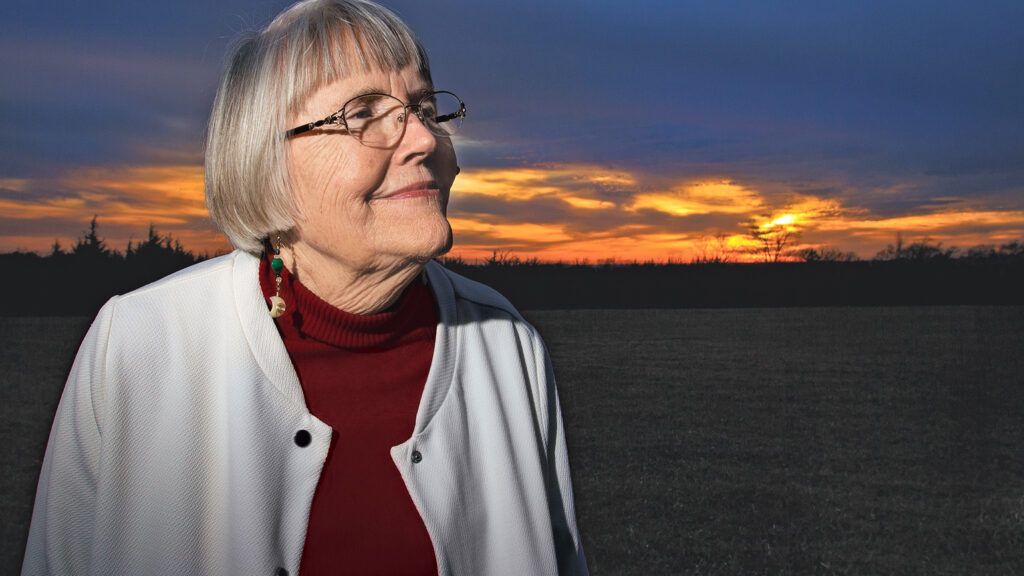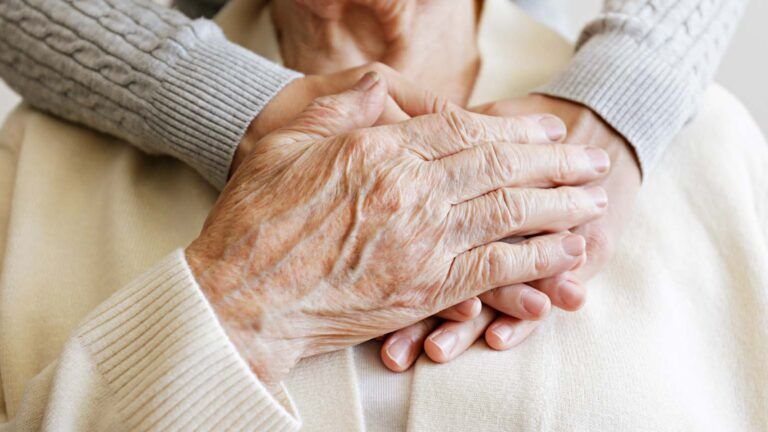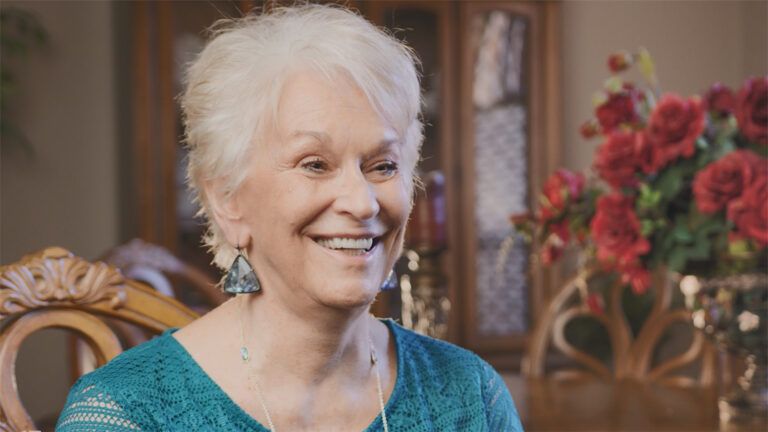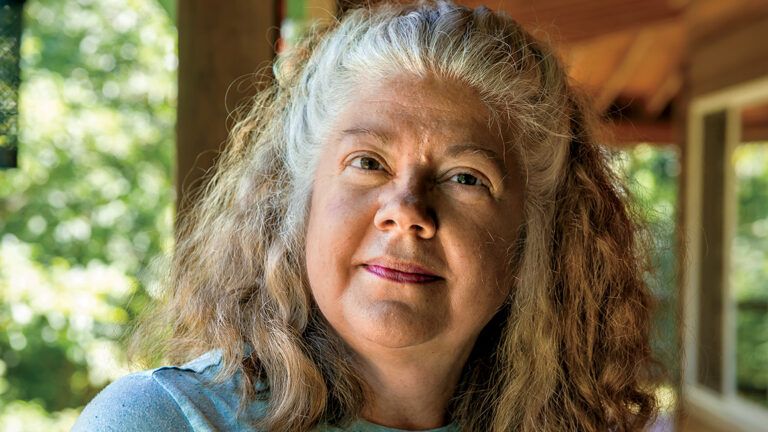My husband, Lee, and I were sitting in the doctor’s office, waiting to hear the results of a stress test. The cardiologist looked grave. “Lee,” he said, “you could drop dead at any moment. Your heart is operating at only twenty-five percent.” Twenty-five percent? Lee had always been so healthy!
Lee’s face turned pale. He seemed a million miles away. “You’ll need bypass surgery,” the doctor went on. “And after that, there’ll be a lot of rehab.” It could go on for weeks, months. Lee wouldn’t be able to lift anything or have energy to do much.
Neither of us was young—I was 75 and Lee was 81—but that had never stopped us from doing the things we loved. Writing and singing folk songs, seeing our friends at the Blackbird (our favorite coffeehouse), going to church, working in the garden at our farm. I’d worked for years as a child therapist, and Lee had only just retired from the public TV station in town, where he’d been a top-notch fund-raiser.
I tried to stay focused on the doctor, but what scared me most was becoming Lee’s caregiver. How would I do it? I dreaded the loss of freedom. And I had very little patience for all the things caregivers were supposed to handle: bedpans, wheelchairs, medications, getting up in the middle of the night, all the constant reassurance and support. It made me feel small just to admit it to myself.
For the next few days, we waited for the surgery to be scheduled and tried not to let our worries run wild. In preparation, we bought two deluxe recliners, comfy enough for Lee to sleep in and for me to be next to him, along with a device to help him stand. That meant I wouldn’t have to lift him. We listened to music and talked. I worked on a 1,500-piece jigsaw puzzle.
One day, I wandered outside to take photos of the wildflowers, the birds, the setting sun, the wild turkeys, seeking comfort in God’s creation. Normally I’d post my favorite images on Facebook with some sort of uplifting comment. But I wasn’t feeling so upbeat right now. What could I say? I didn’t want to bum people out.
I announced the upcoming surgery. My fingers hovered over the keyboard. “My friends say, ‘Live in the moment,’” I typed. “Lee and I try, but sometimes we can’t find the off switch to our worries.” I frowned at the words. Should I delete them? I thought of what I’d learned in my years as a therapist. Honesty was everything. Even painful honesty. So I posted the comment.
Later that day, I logged on and was amazed by the number of comments, more than I’d ever gotten before. There were lots of prayers and some lighthearted comments (“Lee is in for a good chance to catch up on videos and reading”), but it was especially helpful to hear people mirroring my feelings. “It’s okay to feel scared,” one friend said. “Or even inadequate.”
In early October, Lee underwent double bypass surgery. He seemed to bounce back. The doctors said his heart was strong. He was in good shape otherwise. I didn’t hesitate to post pictures this time, of Lee smiling ear to ear. And pictures of his nurses and doctors. And the friends who came to visit. Each night I slept next to him at the hospital.
We were back at our farm in a week. I let everyone know on Facebook. The next morning, Lee stirred early. “Can you put on my compression socks?” he asked.
“Of course,” I said. I tugged and pulled but could barely get the socks up past his ankles. The nurse at the hospital had made it look so easy. I stood and yanked hard, worried that maybe I was hurting Lee. Finally, done.
“Can you help me to the bathroom?”
“Sure,” I said. I nearly collapsed under his weight, but we made it there. And back again. Then he wanted a blanket. A glass of water. Soon it was time for his medication.
“Anything else?” I couldn’t stop myself from snapping. “I can only do one thing at a time.”
“I’m sorry,” he said. That only made me feel worse. All my fears about being a lousy caregiver to the man I loved seemed fulfilled. Would every day be like this? If only I could get outside, take a picture, gaze at the wildflowers.
But there seemed no end of things to do. That day or the next or the next. I loved to cook, but in all our 38 years of marriage I’d never had to do breakfast, lunch and dinner for both of us before. Day after day. One morning, I got up before dawn just to get outside. But before I could even get my shoes on, Lee was up. “Can you help me with my socks?” he asked. “I have to get up to go to the bathroom.”
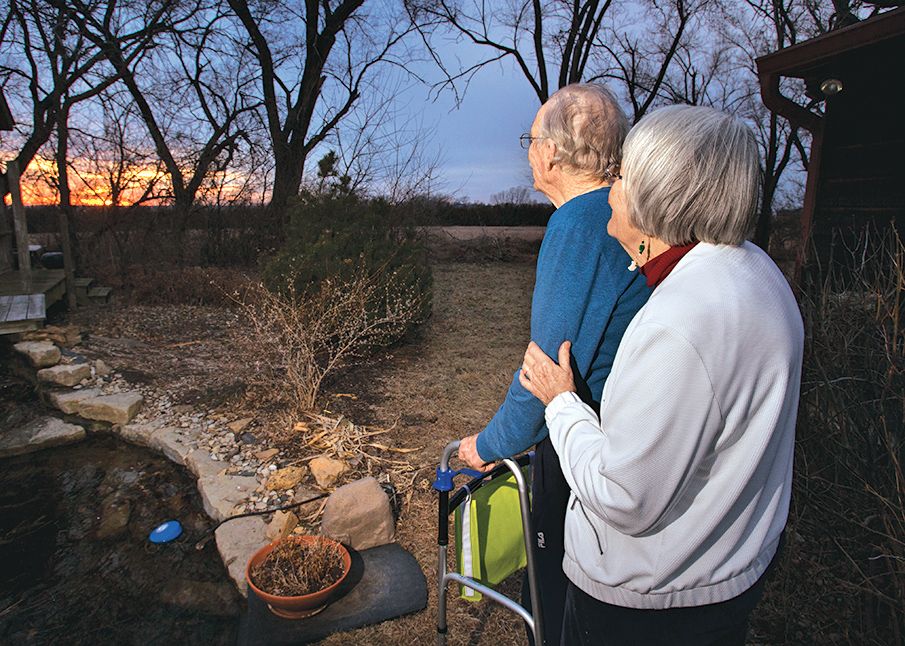
walk together.
I nearly came apart. After that, we made a deal. I needed time on my own to recharge. “Lee,” I told him, “unless it’s an emergency, you’re on your own until 7:30 a.m.” I’d set out a tray next to him with everything he’d need in the morning: pills, half of a banana, some nuts, ginger ale. He understood.
I was able to go outside and connect with nature before I launched into my caregiving role. One night, Lee had a panic attack. And another one. “I drag myself out of bed hoping for a spectacular sunrise,” I wrote on Facebook, “after a night when Lee’s emotions exploded with a panic attack, our second in our up-and-down path after major surgery. All I can do is caress his head, sing soothing songs, pray to God and hope that eventually both of us can calm down and sleep.”
Again the comments came: “Panic attacks are NO fun. I used to have them in the dead of night. Hoping and praying that ALL anxiety passes soon and you both can relax a little.” “Hang in there. It will get better.” “I know this is scary and hard.” It was scary and hard. I didn’t have time to call friends, go out for lunch, go to the Blackbird or even church. Facebook was my refuge, my support system.
In mid-November, Lee had to go back to the hospital. He kept having falls, and the doctors were trying to figure out why. They put in a pacemaker and a defibrillator. I posted photos whenever anything positive happened. Pictures of Lee in physical therapy. Pictures of a high school classmate who visited us one day. “Here, Alice,” she said to me. “I’ve done a painting for you.”
She’d copied a photo I’d done of our garden house, the sun shining through the windows. The painting was magnificent. “Your posts have made such a difference to me,” she said. “Every day they give me a lift.” All this while I’d been worried about sounding self-absorbed or complaining or saying too much or doing too little. But the photos and the posts communicated more than I could have ever imagined.
Lee is home now. He’s going to cardiac rehab, and I’m not a full-time caregiver anymore. I’ve had time to do the things I love—being outside, taking pictures. When we were in the hospital, a friend from church made a delicious apple pie for us, and I’d been waiting to return her plate until I had something to put on it. That moment finally arrived. A big slice of the pineapple upside-down cake that had just come out of my oven. I dropped it off at her house and took a picture.
You can probably guess what I posted on Facebook, the smiling face of a friend who prayed for us—and baked for us—and followed us as Lee and I were going through a hard time. I’d written about our experiences in more detail than I ever intended. That turned out to be a good thing. The best thing, in fact.
Did you enjoy this story? Subscribe to Guideposts magazine.
